Search Results
Showing results 901 to 920 of 1480

Go with the Flow
Source Institutions
In this activity, learners discover how hard their hearts work to pump blood.
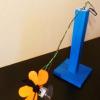
Motorized Balancing Toy
Source Institutions
In this activity, learners build a toy that flies in circles. This activity introduces learners to center of mass, torque, and rotational motion.
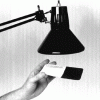
Give and Take
Source Institutions
In this activity, learners explore liquid crystals, light and temperature. Using a postcard made of temperature-sensitive liquid crystal material, learners monitor temperature changes.
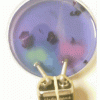
Indicating Electrolysis
Source Institutions
In this activity, learners build a simple electrolysis device. Then learners use an indicating solution to visualize hydrogen and oxygen molecules in water.
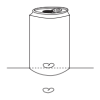
Soda Can Mirrors
Source Institutions
In this activity, learners explore how pictures change in curved mirrors. Learners make cylindrical mirrors by wrapping Mylar around soda cans.
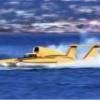
Fun with Speedboats
Source Institutions
In this activity, learners explore how boats are engineered to achieve speed.
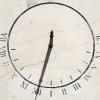
Portable Sundial
Source Institutions
Learners construct one or more of the following kinds of sundials: a shadow plot, a horizontal sundial, and a diptych sundial.
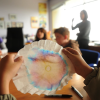
Radial Chromatography
Source Institutions
How many colors make black? Gather as many water soluble black markers as you can find.

A Kazoo for YOU
Source Institutions
In this activity, learners will build an instrument from common household items. Explore sound through vibrations created by your vocal chords and captured by an instrument.
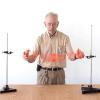
Slinky in Hand: Make waves without getting wet
Source Institutions
Play with a slinky and make transverse waves. In this simple Exploratorium Science Snack, learners will experience making waves and will learn the different parts of a wave.
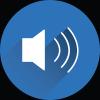
Decibel Cannon
Source Institutions
In this activity, learners will construct an air cannon as a model for the human ear.

Stethoscope
Source Institutions
Make a copy of the first stethoscope with only a cardboard tube! René Laennec invented the first stethoscope in 1819 using an actual paper tube!
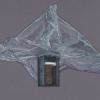
Submarine: Lift Bag Lander
Source Institutions
In this activity (on page 4), learners create a submarine using a plastic sandwich bag. This is a fun way to learn about buoyancy and how captured gas can cause objects to float.

Vortex
Source Institutions
In this activity, learners create a tornado in a bottle to observe a spiraling, funnel-shaped vortex. A simple connector device allows water to drain from a 2-liter bottle into a second bottle.

Sink or Swim?
Source Institutions
Learners observe a tank of water containing cans of diet and regular sodas. The diet sodas float and the regular sodas sink. All the cans contain the same amount of liquid and the same amount of air.
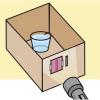
Bending Light
Source Institutions
In this optics activity, learners make a lens and explore how the eye manipulates the light that enters it.
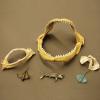
Shark Cart
Source Institutions
In this activity, learners touch and observe skulls of sharks and rays to learn about their diversity (over 400 species of sharks alone!).
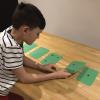
Binary Challenge
Source Institutions
In this activity, learners cut out 5 paper cards and label them with 1, 2, 4, 8, or 16 dot(s) to explore binary digits.
Any Year Calendars
Source Institutions
This PDF contains 12 calendars (12 months). Each month contains activities about math. Things to do on familiar holidays (like July 4), less common holidays (like Backward Day), and any day.
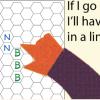
Four in a Line
Source Institutions
This strategy game has simple rules but can be a challenge. Players start with an empty hexagonal grid. On each turn, a player initials one empty hexagon on the grid.
